
Anti-trend
Oro Editions (Verlag)
978-1-954081-05-5 (ISBN)
Anti-trend investigates resilient, anti-trendy living and design as viable alternatives to the insatiable “more wants more” mantra of consumerism. The overall purpose with this book is to encourage designers and consumers to take responsibility for overproduction and overconsumption, and to alter unsustainable production and behavioral patterns.
The anti-trendy design-object is designed to be used. It is created to nourish the user aesthetically on a long-term or short-term basis. It is alive in the sense that it is made to develop in accordance with human life—by either being alterable or perishable. The anti-trendy object supports a life worth sustaining. A life that contains wholesome rhythms and edifying challenges and isn’t dependent on consumption for pleasure.
Anti-trendy living is a natural, fulfilling, and sustainable way to live. It may have many different expressions but is characterised by authenticity and meaningfulness. Reduction of consumption and long-term usage of things is a vital part of anti-trendy living—it involves mending and caring and maybe even sharing.
Through an analysis of resilience and sustainability life in general and in design-objects the themes of the book unfold: intuition and anti-trend research, a life worth sustaining, existentialist despair, raw and resilient aesthetics, sustainable storytelling, legitimisations for designing products in a world with too many things, democratic sustainability, craft innovation, civil disobedience, and collaborative consumption.
Kristine H. Harper is the author of Aesthetic Sustainability and writer of the blog The Immaterialist. Anti-trend was written in Bali, Indonesia, where she has lived for several years. Harper’s main research areas are resilient design solutions, sustainable living, reduction of consumption through design, permaculture, cultural tendencies and trend research, and the preservation of endangered crafts-traditions. She worked as a lecturer of Sustainable Fashion at the Copenhagen School of Design and Technology for a decade, and continues to teach her theories on design, aesthetics, and sustainability at various international design academies.
FOREWORD
INTRODUCTION
1 ANTI-TREND VERSUS TREND
To Be or Not to Be Trendy
The Immaterialist
Analyzing Anti-trendy
Tendencies
Basic Assumptions
The Desires of a Time
An Anecdote Concerning the
Lowering of Productivity
Balancing Between Too Much and
Too Little
degrowth
bad faith
the fisherman and the
businessman
when assumptions collide
2 ANTI-TRENDY INTUITION
The Intuitive Compass
Right and Wrong Hunches
Logical Conclusions
Confirmatory Bias
Intersubjectivity
Immediate Knowledge
Getting to the core of things
Mindful Reduction
Object Analysis
Common Ground and Open Horizons
The Core of Sustainable Living
Disrupting the Familiar
Epoché
Human Common Ground
The Importance of Fiction
The Stabile Core
The Sublime Moment of Insight
Momentary Elimination of the Familiar
Transitions
Synaesthesia and Sensory Experiences
Aisthetikos
Open Sensing
magic
Learning to Navigate Intuitively
Intuitive Forecasting
ubuntu
the guiding principle of inner needs
3 ANTI-TREND AND AUTHENTICITY
Living in despair
The Aesthete
Civil Disobedience, or the Art of
Choosing “the Good”
Change Must Come from the Individual
Oppression
restlessness
The Importance of Acknowledgement
the master and the slave
To Will Oneself Free is also to Will Others Free
being connected
Genuine Freedom
the ethicist
Irrational versus Pre-rational
Consumption
The Sustainable Golden Mean
encouraging usage
discovering aesthetic links
Sustainable Storytelling
values and beliefs
sustainable forms of appeal
pathos
Time and Value
No-pain-no-gain
Resilient Living
Nourishing Repetitions
A Life Worth Sustaining
Status Symbols
The Emperor and the Painter
4 ANTI-TRENDY EXPERIENCES OF
BEAUTY
Anti-trendy Perceived Obsolescence
Magical Things
Disinterested Pleasure
Aesthetic Nourishment
Resilient Aesthetics
The Cathartic Experience
robustness
relevance
Unbearable Lightness
Wild and Raw Aesthetics
Rewilding the Design-object
Adaptability
The Beauty of Rhythms
The Daily Chorus
Continuity
Aura
5 THREE ANTI-TRENDY REASONS FOR
DESIGNING NEW OBJECTS IN A
WORLD WITH WAY TOO MANY
THINGS
Waste Materials, Deconstruction, and
Upcycling
Crafty Imperfections
Boro and Hacks
Disassembly
Sustaining and Empowerment
The Essence of a Craft Expression
the tactile bond
tactile literacy
Craft Innovation
Democratic Sustainability
Encouraging Sustainable Living
Collaborative Consumption: Swapping,
Sharing, and Repairing
the characteristics of a shareable
object
inclusive design
repairability, flexibility, and
aesthetics
Long-lived and Short-lived Objects
encouraging variety and
celebrating change
the butterfly
embracing transience
facticity and transcendence
The Open, Raw Design-object
broadness and affordability
no person ever steps into the
same river twice
6 THE ANTI-TRENDY DESIGN-
OBJECT
Creating Resilient Designobjects
Natural Limitations
Alteration
Resilience to Changing Needs
regrowth
Resilience to Anti-trendy Perceived
Obsolescence
Deterioration
Resilience to Fleeting Trends
Resilience to Exploitation of Natural
Resources
permaculture
anti-growth
closedness versus openness
Biblography
About the Author
| Erscheinungsdatum | 14.02.2022 |
|---|---|
| Mitarbeit |
Cover Design: Theodore Guidotti |
| Zusatzinfo | 50 Illustrations, color |
| Verlagsort | San Rafael |
| Sprache | englisch |
| Maße | 177 x 228 mm |
| Gewicht | 752 g |
| Themenwelt | Kunst / Musik / Theater ► Design / Innenarchitektur / Mode |
| Naturwissenschaften ► Biologie ► Ökologie / Naturschutz | |
| Sozialwissenschaften ► Soziologie | |
| ISBN-10 | 1-954081-05-7 / 1954081057 |
| ISBN-13 | 978-1-954081-05-5 / 9781954081055 |
| Zustand | Neuware |
| Haben Sie eine Frage zum Produkt? |
aus dem Bereich


